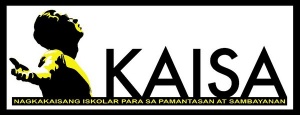KAISA - Nagkakaisang Iskolar para sa Pamantasan at Sambayanan

About
KAISA is a progressive political party and dynamic student formation that envisions itself as an agent of social change through competent student leadership, proactive political action and effective social involvement. Through campaigns, services and activities, KAISA aims to innovatively promote and faithfully protect the rights and welfare of the students, and to provide them fresh and relevant avenues for participation in the community.
Established on May 5, 2005, KAISA sounded “a call to principled leadership, to struggle for the holistic emancipation of students toward greater social consciousness and responsibility.”
KAISA believes in the timeless ideal of the UP student as scholar-activist. As scholars, UP students must fulfill their academic commitments and excel in their respective disciplines. As activists, UP students must use their academic excellence in a social context, by using their skills, talents and knowledge to advance democracy and bring about social change.
In addition, KAISA affirms both the pluralism of ideas in democratic discourse and the power of decisive action. KAISA wants neither to be bogged down by endless debate and academic speculation nor to be boxed by narrow ideologies and rigid paradigms. KAISA also affirms the idea of collective decision and concerted action.
In solidarity with marginalized sectors of society, KAISA pursues a multisectoral approach to raise awareness and inculcate in its members heightened social consciousness and a deeper sense of social responsibility. KAISA draws inspiration and wisdom from the experience of previous political formations: Sandigan ng mga Mag-aaral para sa Sambayanan (SAMASA) established in 1980; Independent Student Alliance (ISA) founded in 1987; Sandigan para sa Mag-aaral at Sambayanan (SAMASA) reorganized in 1995; Student Agenda for Principled Involvement (SAPi) founded in 2000; and CONVERGENCE established in 2001.


